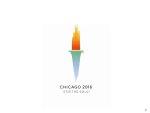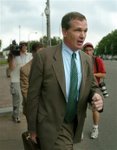Chicago Tribune Editorial
March 15, 2007
Chicago aldermen signed on Wednesday to a $500 million guarantee for the 2016 Olympic Games on behalf of city taxpayers. If they were worried about such a large commitment, it wasn't reflected in the vote. It passed 45-5.
There is a financial risk in that commitment, even if city officials say it is slim. There is also a risk that the lopsided council vote will encourage the Daley administration to think it can continue to pat the aldermen on the head and tell them not to worry about Olympics spending, it will all work out.
The city promises to pay up to $500 million in the event the experts' rosy projections of a spectacular 2016 Summer Games in Chicago implode. That's the equivalent of nearly 10 percent of the 2007 city budget. It's about what the city collected in sales taxes last year.
That public commitment demands that Mayor Richard M. Daley and the Chicago 2016 committee be much more transparent than they've been about how this massive project will be financed. Taxpayers shouldn't be continually surprised and chagrined that the mayor and the organizers have told them one thing and done another.
It looks like they have done just that again. The Tribune reported Wednesday that the Metropolitan Pier & Exposition Authority will sell air rights over the land where the Olympic Village would be built and hand the proceeds to the Olympic project. That amounts to a government infusion of $100 million to $125 million into the Olympics--though Daley said government wouldn't be bankrolling this project.
The Olympic Village site, which would leave the city with permanent housing on the Near South Side, seems to make sense. But the air rights deal was made in January and not revealed to aldermen until last Friday--and not revealed to taxpayers until the Tribune reported it.
That kind of secrecy has to stop. It's time for the city and the Chicago 2016 committee to put all their financial projections and planning in the open--now, not after the site for the 2016 Games is sealed in April.
The Chicago 2016 committee projects a $525 million surplus from the Games. The committee calls that a conservative estimate, based on revenue streams from past Olympics--ticket sales, television rights, corporate sponsorships and the like. But we're being asked to accept largely on faith that this is conservative planning, because only scant details about revenues and costs have been produced.
We do know some details. If the Games lose money, the first $200 million in losses would be covered by revenues generated by skyboxes and suites at major venues, including the new temporary stadium at Washington Park; money from the developer of the Olympic Village; and other private donations.
The city would be liable for the next $250 million in losses. The $250 million after that would be covered by unspecified private sources and other government entities.
And if things got even worse, the city would be liable for up to another $250 million. At this point, Chicago 2016 would have gone in the record books as losing nearly $1 billion.
Yes, that's a doomsday scenario. It's reassuring that the 2002 Winter Olympics took place in Salt Lake City just six months after the Sept. 11, 2001, terrorist attacks, and did not lose money. The 1996 Games in Atlanta were jarred by a bombing, but didn't lose money. There's good reason to believe Chicago can run a spectacular Olympics and wind up in the black.
Just don't hide the facts.
March 15, 2007
Chicago aldermen signed on Wednesday to a $500 million guarantee for the 2016 Olympic Games on behalf of city taxpayers. If they were worried about such a large commitment, it wasn't reflected in the vote. It passed 45-5.
There is a financial risk in that commitment, even if city officials say it is slim. There is also a risk that the lopsided council vote will encourage the Daley administration to think it can continue to pat the aldermen on the head and tell them not to worry about Olympics spending, it will all work out.
The city promises to pay up to $500 million in the event the experts' rosy projections of a spectacular 2016 Summer Games in Chicago implode. That's the equivalent of nearly 10 percent of the 2007 city budget. It's about what the city collected in sales taxes last year.
That public commitment demands that Mayor Richard M. Daley and the Chicago 2016 committee be much more transparent than they've been about how this massive project will be financed. Taxpayers shouldn't be continually surprised and chagrined that the mayor and the organizers have told them one thing and done another.
It looks like they have done just that again. The Tribune reported Wednesday that the Metropolitan Pier & Exposition Authority will sell air rights over the land where the Olympic Village would be built and hand the proceeds to the Olympic project. That amounts to a government infusion of $100 million to $125 million into the Olympics--though Daley said government wouldn't be bankrolling this project.
The Olympic Village site, which would leave the city with permanent housing on the Near South Side, seems to make sense. But the air rights deal was made in January and not revealed to aldermen until last Friday--and not revealed to taxpayers until the Tribune reported it.
That kind of secrecy has to stop. It's time for the city and the Chicago 2016 committee to put all their financial projections and planning in the open--now, not after the site for the 2016 Games is sealed in April.
The Chicago 2016 committee projects a $525 million surplus from the Games. The committee calls that a conservative estimate, based on revenue streams from past Olympics--ticket sales, television rights, corporate sponsorships and the like. But we're being asked to accept largely on faith that this is conservative planning, because only scant details about revenues and costs have been produced.
We do know some details. If the Games lose money, the first $200 million in losses would be covered by revenues generated by skyboxes and suites at major venues, including the new temporary stadium at Washington Park; money from the developer of the Olympic Village; and other private donations.
The city would be liable for the next $250 million in losses. The $250 million after that would be covered by unspecified private sources and other government entities.
And if things got even worse, the city would be liable for up to another $250 million. At this point, Chicago 2016 would have gone in the record books as losing nearly $1 billion.
Yes, that's a doomsday scenario. It's reassuring that the 2002 Winter Olympics took place in Salt Lake City just six months after the Sept. 11, 2001, terrorist attacks, and did not lose money. The 1996 Games in Atlanta were jarred by a bombing, but didn't lose money. There's good reason to believe Chicago can run a spectacular Olympics and wind up in the black.
Just don't hide the facts.




No comments:
Post a Comment